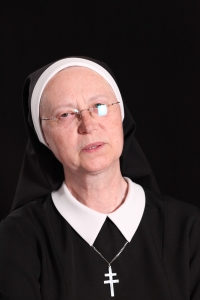I had no idea that it was possible to join the religious order even in the time of totalitarianism

Download image
Helena Bystřická, religiously named Sister Ludmila, was born on July 22, 1958 in Kyjov. Her grandfather František Vaďura fought in the First World War, during the First Republic he bought a farm in Žádovice in Hodonín area, which the family lost after the start of communism. The grandfather´s son Josef Vaďura was then sentenced in 1951 in a Kangaroo court for high treason to 11 years in prison. Helena Bystřická grew up with her siblings and parents – Marie and Josef – in Žádovice. Her father Josef Bystřický was fully deployed in Graz from 1942, after the war he worked as a teacher in neighboring Ježov. After elementary school, the witness joined a textile factory in Svatobořice-Mistřín, where she stayed for the next 13 years. In 1887, she moved to Velehrad, took care of disabled children in Stojanov, and began to live the community life of nuns. Two years later, she secretly entered the order, took her first vows and became a part of the Congregation of the Sisters of St. Cyril and Methodius. After the Velvet Revolution, she completed her education at the theological faculty in Olomouc. In 2022, she continued to be involved in the congregation, working in a charity home for nuns in Velehrad and teaching religion.
